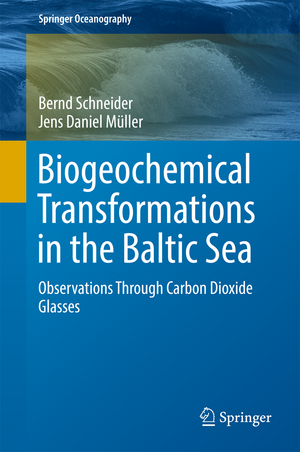Biogeochemical Transformations in the Baltic Sea: Observations Through Carbon Dioxide Glasses: Springer Oceanography
Autor Bernd Schneider, Jens Daniel Mülleren Limba Engleză Hardback – 9 aug 2017
Din seria Springer Oceanography
- 15%
 Preț: 638.43 lei
Preț: 638.43 lei - 18%
 Preț: 988.37 lei
Preț: 988.37 lei - 24%
 Preț: 1199.75 lei
Preț: 1199.75 lei - 18%
 Preț: 952.89 lei
Preț: 952.89 lei - 20%
 Preț: 572.65 lei
Preț: 572.65 lei - 15%
 Preț: 649.87 lei
Preț: 649.87 lei - 18%
 Preț: 1115.77 lei
Preț: 1115.77 lei - 18%
 Preț: 803.53 lei
Preț: 803.53 lei - 18%
 Preț: 891.33 lei
Preț: 891.33 lei - 15%
 Preț: 647.27 lei
Preț: 647.27 lei - 18%
 Preț: 939.62 lei
Preț: 939.62 lei - 18%
 Preț: 726.37 lei
Preț: 726.37 lei - 18%
 Preț: 783.20 lei
Preț: 783.20 lei - 18%
 Preț: 778.45 lei
Preț: 778.45 lei - 24%
 Preț: 728.84 lei
Preț: 728.84 lei - 18%
 Preț: 888.97 lei
Preț: 888.97 lei - 18%
 Preț: 945.92 lei
Preț: 945.92 lei - 18%
 Preț: 776.57 lei
Preț: 776.57 lei - 18%
 Preț: 724.00 lei
Preț: 724.00 lei
Preț: 694.55 lei
Preț vechi: 817.12 lei
-15% Nou
Puncte Express: 1042
Preț estimativ în valută:
132.91€ • 137.98$ • 110.83£
132.91€ • 137.98$ • 110.83£
Carte tipărită la comandă
Livrare economică 22 martie-05 aprilie
Preluare comenzi: 021 569.72.76
Specificații
ISBN-13: 9783319616988
ISBN-10: 3319616986
Pagini: 110
Ilustrații: XII, 110 p. 54 illus.
Dimensiuni: 155 x 235 x 13 mm
Greutate: 0.35 kg
Ediția:1st ed. 2018
Editura: Springer International Publishing
Colecția Springer
Seria Springer Oceanography
Locul publicării:Cham, Switzerland
ISBN-10: 3319616986
Pagini: 110
Ilustrații: XII, 110 p. 54 illus.
Dimensiuni: 155 x 235 x 13 mm
Greutate: 0.35 kg
Ediția:1st ed. 2018
Editura: Springer International Publishing
Colecția Springer
Seria Springer Oceanography
Locul publicării:Cham, Switzerland
Cuprins
1. Introduction.- 2. Fundamentals.- 3. The data basis.- 4. The Baltic Sea CO2 system.- 5. The gas exchange balance.- 6. Extreme situations.- 7. Anthropogenic impacts.- 8. The Gulfs.
Textul de pe ultima copertă
This book provides a comprehensive review of the biogeochemistry in the Baltic Sea. It is based on the fact that biogeochemical processes that are relevant for the ecological state of the Baltic Sea (and other sea areas), are all in some way related to the production and mineralization of organic matter (biomass) and thus are associated with the consumption or release of CO2. The significant progress with regard to our chemical analytical capabilities concerning the marine CO2 system has facilitated new approaches to study the Baltic Sea biogeochemistry, in particular with regard to a quantitative process understanding. To demonstrate this, the authors present the fundamentals of the marine CO2 system in a theoretically sound, but still intelligible way. This is followed by a comprehensive presentation of our current knowledge about the CO2 system in the Baltic Sea and the implications for our understanding of biogeochemical
processes such as production/mineralization of organic matter and the stoichiometry involved, nitrogen fixation, denitrification, and phosphate transformations at varying redox conditions. Finally, the CO2 gas exchange balance and related problems such as acidification are addressed.
processes such as production/mineralization of organic matter and the stoichiometry involved, nitrogen fixation, denitrification, and phosphate transformations at varying redox conditions. Finally, the CO2 gas exchange balance and related problems such as acidification are addressed.
Caracteristici
Presents a coherent description of the major features of the Baltic Sea biogeochemistry as inferred from its unique marine CO2 system Presents the complex relationship between the variables of the marine CO2 system and the peculiarities of the Baltic Sea acid-base system in an intelligible way, also understandable for non-chemists Demonstrates the use of CO2 data for the analysis of biogeochemical processes Provides support for implementing the marine CO2 system into biogeochemical models Includes supplementary material: sn.pub/extras
